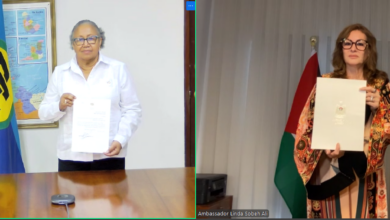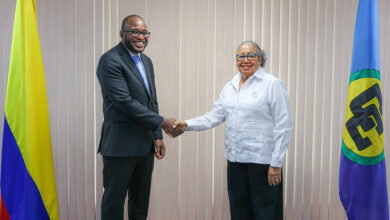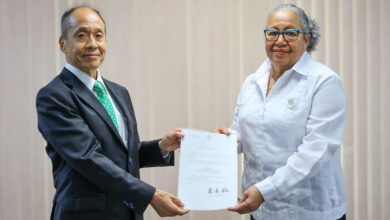Arthur Napoleon Raymond Robinson, a national of Trinidad and Tobago was born in the Island of Tobago on 16 December 1926. He served his country and people with distinction, honour and fortitude in winning, sustaining and advancing their independence. Convinced of the importance of regional integration for the preservation of that independence he was a staunch supporter of Caribbean regionalism and provided vital leadership to the Caribbean Community at a critical moment in its history.
ANR as he is popularly known prepared himself for service to his country with determination and purpose. He excelled at primary and secondary school in Tobago. While working in the Public Service of the Government of Trinidad and Tobago he earned the Bachelor of Law Degree as an external student of London University and thereafter moved to England to further his studies. In London he qualified as a barrister at Inner temple and then went on to read for the Master of Arts Degree in Philosophy, politics and Economics.
On his return to Trinidad and Tobago in 1955, A.N.R Robinson brought with him a zeal – shared by many intellectuals of his time – for changing the social and economic conditions of his people and a desire to redress the negative effects of an outdated colonial system by working for its replacement as a form of government. In practical terms, he recognised an urgent necessity for creating a strong political force, supported by the collective will of the people, that would provide leadership and guidance in their struggle for self-determination. For the next 40 years, Mr. Robinson was to be an outstanding figure in the political life of his country and the Region serving in several different leading capacities.
He began his political career as a founder member of the Peoples National Movement, the party which led the people of Trinidad and Tobago to Independence in 1962. He served as Deputy Political Leader, Minister of Finance, Minister of External Affairs, before leaving the Peoples National Movement in 1970.
During 1971 to 1985 he focussed his political activities on Tobago and was elected First Chairman of the Tobago House of Assembly in 1981. He served in this capacity until 1986
In 1986, A.N.R Robinson returned to national politics as leader of the National Alliance for Reconstruction which won the national elections and served his people and country as Prime Minister until 1991. Between 1991 – 1995 he was a Member of Parliament and in 1995 he forged a coalition with the United National Congress to form the present government of Trinidad and Tobago. In 1997 Arthur Napoleon Raymond Robinson was elected President of the Republic of Trinidad and Tobago, thus being the only person to hold the offices of Chairman of the Tobago House of Assembly and Prime Minister and President of the Republic of Trinidad and Tobago – the Trinity Cross.
While actively involved in the struggle for the self determination of the people of Trinidad and Tobago and the creation of an independent state, A.N.R Robinson always displayed an acute awareness of the relationship between the economic, political and social development of the wider Caribbean region.
He was also sensitive to the opportunities for providing leadership within the international community. In this latter regard he is renowned for his campaign for the establishment of the International Criminal Court and is the recipient of two awards. In 1977 he received the Distinguished International Criminal Law Award from the Foundation for the Establishment of the International Criminal Court – a UN affiliate. In 1977 he was also awarded the “Defender of Democracy” Award from Parliamentarians for Global Action at the UN.
A.N.R Robinson’s regional service essentially began as Parliamentary representative for Tobago in the Federal Parliament of 1958 to 1962. Perhaps his most significant contribution to Caribbean regionalism however was his perceptive “Caribbean Initiative” address at the Conference of Heads of Government of the Caribbean Community held in Grenada in 1989 in which, with great incisiveness born of conviction, experience, and not a little hope, he analysed the current Caribbean situation and called for an urgent deepening of the CARICOM integration process as the best hope not only for our survival but as the only way toward a much stronger and more viable Community. He appealed to the people of the Caribbean to prepare for their future urging them
“To consider how best to bring about real betterment in their condition of life, to achieve their full potential as free people responsible for their own destiny, and to improve their Region’s place in the community of nations.”
The rest is history. The Grand Anse Declaration for the Advancement of the Integration Movement, issued at the conclusion of that historic Conference, and which led to the appointment of the West Indian Commission is regarded as by many observers as critical to the determination of the future development of the Community. That we are today celebrating the Twenty Fifth Anniversary with great hope for the new millennium is due in large measure to His Excellency President Robinson’s dynamism, his intellectualism and his depth of understanding of the Caribbean society as well as his role in making Trinidad and Tobago a committed and leading member of the regional integration movement.
For his outstanding contribution to the development of the Caribbean region, the Caribbean Community salutes its distinguished son, Arthur Napoleon Raymond Robinson by conferring on him the Order of the Caribbean Community (OCC).
Vere Cornwall Bird Snr, a national hero of Antigua and Barbuda was born on 7 December 1910. He dedicated his career to ensuring the social, political and economic development of the peoples of Antigua and Barbuda. He believed that this development was inextricably linked to the pursuit of better working conditions for the people of Antigua and the integration of the West Indian islands. Out of this dedication, commitment and belief, emerged a leader and visionary who served his people and the Region with distinction for over 50 years.
Several significant changes in the social and political conditions of the people of Antigua and Barbuda were achieved under the leadership of Vere Cornwall Bird Snr. He co-founded the Antigua Trade and Labour Union in 1940 and was elected President in 1943, remaining its leader and mentor until 1973.
Under his dynamic leadership, the Union secured the recognition as the bargaining agent for the workers and achieved significant changes in the working conditions of the people. These achievements included the abolition of child labour; holidays with pay; and retirement benefits in the form of gratuities and pensions. The Union also promoted the interests of small farmers through the establishment of the Peasant development Office.
Success in the labour arena was accompanied by his active participation in the constitutional reform process in Antigua and Barbuda. Vere Cornwall Bird Snr was an integral part of this process. With the support of the working people, Vere Cornwall Snr was elected to the Antigua Legislative Council in 1946. He campaigned for adult sufferage which was granted in 1951. In 1961 when the Ministerial system was introduced he became Chief Minister and in 1967 Premier of Antigua and Barbuda when Antigua and Barbuda advanced to ” State in Association with Britain”. In 1981, he capped his remarkable career when he became the first Prime Minister of an independent Antigua and Barbuda.
The Rt. Hon. Vere Cornwall Bird Snr was as relentless and persistent in the pursuit of and support for regional integration as he was for social and political reform in Antigua and Barbuda. Under his presidency, the Antigua Trade and Labour Union was a founder member of the Caribbean Congress of Labour. He was an active participant of the historic conference on the Closer Association of the British West Indian Colonies held in 1947 in Montego Bay, where the idea of a Caribbean Political Federation was first proposed.
When efforts at political integration failed, Vere Cornwall Bird Snr persisted, and convinced of the benefits of working together, led the search for alternative forms of integration. With the late Errol Barrow of Barbados and the late Forbes Burnham, then Premier of Guyana, he kept the concept of integration alive. Their work at Dickenson Bay, Antigua in 1965, led to the signing of the CARIFTA Agreement in 1968, laying thereby, the foundation for the present Caribbean Community.
Vere Cornwall Bird Snr was also a driving force in the formation of the Association of West Indian States which later evolved into the present Organisation of Eastern Caribbean States, a cohesive sub-regional organisation. In 1965 he became the First Chairman of the Organisation of Eastern Caribbean States.
The long and distinguished career of the Rt. Hon. Vere Cornwall Bird Snr was one of deep and committed struggle in the interests of the working people of Antigua and Barbuda and of the wider West Indies. His work and career are based on a recognition that real and sustained development rested on the unity of the Caribbean people. As the oldest surviving member of that pioneering group of leaders for Caribbean Unity, few will deny that Vere Cornwall Bird Snr has first claim to the title of Patron of the Movement for Caribbean integration, development and progress.
For his outstanding contribution to the development of the Caribbean Region, the Caribbean Community salutes its distinguished son, Vere Cornwall Bird, by conferring on him the Order of the Caribbean Community (OCC).
The statistical record of his achievements is most impressive and reflects his complete mastery of the game of cricket. He was an accomplished batsman, a bowler of great versatility, a fieldsman to be feared, an ambitious captain. He is revered the world over for his skill as well as for his sportsmanship. He has been described in the Guinness Cricket Encyclopedia as simply the greatest all-rounder ever to have played cricket and has been eulogised as the greatest cricketer on earth by none other than Dr. Francisco Slinger popularly known as Mighty Sparrow – himself not without claims of being the greatest in his field. Garfield St. Auburn Sobers has now become the standard by which all other cricketers are and will be judged.
Born in Barbados 62 years ago, this gifted Caribbean man epitomised what the game of cricket is all about. He was a household name wherever the game was played. To the thousands of purists and enthusiasts who thronged to see him or listened to his exploits on the radio, he was their example of what cricket really was about and how it should be played. And to the very young West Indians, he served to expand their ambitious horizons by adding ” I want to be a cricketer like Sobers” to their other career choices.
What is amazing about this special person we are honouring today is that had he decided to concentrate on football, or basketball or even golf, his would still have been a great success story. Legend indeed has it that on his way to England to become a professional cricketer, he stopped over in New York and went to a baseball practice and did so well that in short order he was offered an immediate contract. Of course happily he declined. This experience it is further reported was to be repeated in London in relation to football – as a goal keeper. He declined again to become the greatest cricketer the world was to see.
The first-class cricket career of Garfield Sobers produced over 28,000 runs at an average of 55 runs per innings including 86 centuries. As a bowler of spin, swing, and pace, he captured 1,043 wickets at an average of just under 28 runs per wicket; and as a fieldsman, he returned 407 batsmen disconsolately to the pavilion.
His test career was no less brilliant. He played in 93 tests, scoring 8,032 runs at an average of just under 58 runs per innings making 26 centuries in the process. His first century was the record breaking 365 not out made in Kingston, Jamaica during the 1957/58 Pakistan tour. This record of the highest test match innings was to stand for 37 years. He also took 235 wickets at an average of 34 runs per wicket and 109 catches, most of them in dangerous close to the wicket positions.
Between his first major league cricket match and his last, which included stints in Australia and England he wrote and rewrote the record books in every country he played, delighting all who saw him with his brilliance in all aspects of the game such as scoring six sixes in one over – an unbreakable record. His exploits on the field of play have been the subject of numerous books, articles and speeches over the years, all giving testimony to his greatness as a cricketer. Among the many tributes to him was that given by the late Michael Manley, Prime Minister of Jamaica, who adjudged that there were only three cricketers in the history of the game who stood head and shoulders above all others – prototypical figures or ultimate symbols as he described them. There was W.G. Grace to the 1930s. Then Sir Donald Bradman to the late 1940s; and during the years from 1958 to 1976 there was Garfield St. Auburn Sobers. In this entire period of cricketing history, there were no other ultimate symbols, merely great players.
Garfield Sobers is the recipient of numerous awards and honours in tribute to his greatness as a cricketer. He was knighted in 1975 by Her Majesty the Queen of England for his contribution to the game – a signal honour shared by only a few illustrious recipients within this century. And in 1998 his native Barbados formally recognised him as a National Hero.
To think of Sir Garfield simply as a cricketer or as a prototypical cricketing figure is to do great injustice to the wider impact which the man and his career have had in breaking down the historical legacies of social and geographical insularity and ultimately on the development of the movement for Caribbean integration through cooperation. As we listened to and read of his exploits – and for those of us fortunate to have seen him in action – he was what we could be as individuals regardless of our social status. We identified with Sir Garfield and glorified in the fame and respect that being a West Indian brought us.
West Indians everywhere, here in the Caribbean and out there in the diaspora stood taller as a people, were themselves recognised as belonging to a significant regional space and derived a new sense of pride in being West Indian.
The West Indies Cricket team was no longer regarded by us as a group of persons from this Region to be lauded for their individual exploits and ignored when they failed, This highly significant transformation which began under Frank Worrell was well carried through by Sir Garfield. Since then the West Indies Cricket team has become a symbol of Caribbean pride, respect and unity and today we are the grateful beneficiaries.
The Treaty of Chaguaramas, the 25th Anniversary of which we are celebrating today, specifically refers to functional cooperation as one of the fundamental bases upon which the Caribbean integration movement is to be fashioned and developed. Garfield Sobers, during his cricket-playing years, including his 39 Tests as Captain of the West Indies Cricket Team, created an important structural support for the edifice of Caribbean unity and set an example of what people of the Region can achieve both in practical and psychological terms through working together. The Caribbean Community owes a great deal of its success, in the struggle for greater integration, to the achievements of the West Indies Cricket Team and a debt of gratitude to Garfield St. Auburn Sobers who carried the torch during his playing career and who inspired all those who came after,
For his outstanding contribution to the development of the Caribbean Region, the Caribbean Community salutes its distinguished son, Sir Garfield St. Auburn Sobers, by conferring on him the Order of the Caribbean Community (OCC).
Phillip Manderson Sherlock was born in Portland, Jamaica on 25 February 1902. His formal schooling was at Calabar College where, immediately on graduation, he was appointed a Master at the school. This early indication of the superior intellect of the man we are honouring today became even more evident when, as an external student, he obtained two Degrees – A First-Class BA General, and a First-Class BA Honours (English) – from the University of London.
A brilliant yet humble man, he understood the people and, through that understanding, empowered them to be better citizens. When he left teaching in 1939 to become Secretary to the Institute of Jamaica and later Education Officer of Jamaica Welfare Limited, he was to demonstrate his incredible talent at making people, particularly at the grassroots level, recognise that they were also important citizens and that they too had a role to play in the shaping of their society. He actively developed and promoted among them the concept that, through community action, they could make a significant contribution to the process of national development.
Perhaps his genius for relating to people lay in his deep acceptance of culture and cultural values as being synonymous with creativity, on the one hand, and on the other, as an indispensable factor in assessing the state of development of a nation. It was a natural development for him to become a virtual patron of the arts. Few are aware that Phillip Manderson Sherlock was a promoter of the popular comedy team of the 1930s – Slim and Slam – or that he was a renowned teller of Anancy stories. He was a poet of more than passing repute, a researcher into and a conservator of folk culture. In between all these activities, Phillip Sherlock found time to write several books ranging from readers for young children to historical works for university students; and of course, there was his biography of the great Jamaican leader Norman Washington Manley.
For his service to the people of Jamaica and to the wider Caribbean, he has been the recipient of numerous awards and honorary doctorates including a Knighthood from her Majesty the Queen of England, Doctorates from the University of New Brunswick and Acadia University, the Order of Andres Bello from Venezuela, the Gold Musgrave Medal of the Institute of Jamaica; and to crown them all, the Order of Merit of Jamaica.
The dimension of Sir Philip’s life for which he is perhaps best known is his long-standing and intimate relationship with the University of the West Indies. He is due no small credit for the impact which the University has had on the development of the Caribbean Community during the 50 years of its existence.
In 1945, as a member of the Irvine Commission, he was a party not only to the recommendation for the establishment of University College of the West Indies but was also largely responsible for setting up its Extra Mural Department which he regarded as a fundamental supporting plank to the University. By the time the University opened its doors to the first students in 1948, Sir Philip had already begun to work as the Region’s first Director of Extra Mural studies – a post he held until 1959.
In 1960, he was appointed Pro Vice-Chancellor and headed the new campus at St. Augustine, Trinidad and Tobago where he presided over the birth of the Faculty of Engineering and the transformation of the Imperial College of Tropical Agriculture into the Faculty of Agriculture. On his return to Jamaica as Vice Chancellor of the University his contributions included the opening of several Faculties at the Cave Hill campus in Barbados and giving his blessing to the start of evening classes in the Arts and Sciences at all three campuses.
Apart from these numerous other tangible indicators of his Mission Statement for the University, his tenure was to witness the establishment of what has been described as the Sherlock Vision of the creative arts and humanities, acting as catalyst for intellectual pursuits whilst remaining handmaiden to the scientific and technological branches of knowledge. This vision he institutionalised partly through the introduction of a creative arts plank in the outreach work of the Extra Mural Department and the eventual establishment of the Creative Arts Centre on the Mona Campus.
Philip Manderson Sherlock’s contribution to the University and to the community it served can best be appreciated when viewed from his own perspective. In his view, “the University represents a special kind of partnership between many peoples. It represents a West Indian effort at collaboration that is in direct opposition to the fragmentation and divisions imposed on the Region by the Imperial rivalries of distant powers. It represents the cooperation of free peoples in a community whose history has been one of competition.” His life’s work has been an active and dedicated interpretation, and demonstration, of this vision.
This year, the University of the West Indies celebrates its 50th anniversary. Sir Philip was there from the inception setting standards by his personal example, guiding its progress and above all, selling his conviction of what the University should be both of itself, and to the people it serves. We congratulate him for a task executed with exceptional skill and grace. A fitting tribute to this lifetime of dedicated service has been the most recent award he has received – the Pelican Award – from those whose lives he touched in so many ways – the Guild of Graduates of the University of the West Indies.
Sir Philip continues to serve the Caribbean Community as an agitator for positive change. His recent co-authoring of a book , the History of the Jamaican People, and in particular, his commentaries as a columnist as well as his “change from within” programme have led to a recent description of him as a revolutionary – no mean accolade for a nonagenarian.
For his outstanding contribution to the development of the Caribbean Region, the Caribbean Community salutes its distinguished son, Philip Manderson Sherlock, by conferring on him the Order of the Caribbean Community (OCC).





